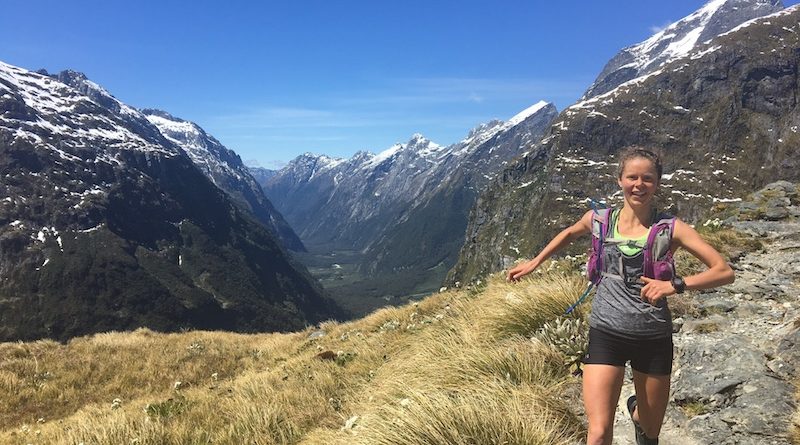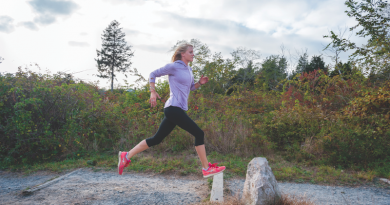Reader Athlete: The Ultra Runner Ph.D. Candidate
The Ultra Runner Ph.D. Candidate
Name: Britta Clark Age: 24 From: Goshen, Vermont Family: Parents, Tony Clark and Shari Brown; Brother, Oliver; Dogs, Remy and Weezer Primary Sports: Ultra trail running Occupation: Soon-to-be Harvard Ph.D. student in philosophy, server at Blueberry Hill Inn and Outdoor Center Dream Job: Philosophy professor and
Owner/Steward of Blueberry Hill
On June 23, Britta Clark came in first place for women in the Catamount 50K at Trapp Family Lodge and Outdoor Center in Stowe. A week later, she finished second overall in The Endurance Society’s Marathon in Goshen. The next seven finishers were all men and the race was on turf she knew well: the trails that surround Blueberry Hill Inn, where she grew up. Trail running is in Clark’s blood: she grew up exploring and helping her father, Tony Clark, maintain the trails at his Blueberry Hill Inn and Outdoor Center in Goshen. This fall, After having spent the last two years completing a Fulbright scholarship in New Zealand (and running really long foot races through the jungles of Malaysia), she started a five-year Ph.D. program in intergenerational justice at Harvard. Clark was invited to compete in the SkyRunning World Championships in Scotland this past September but declined as she was starting school.
How did you get into ultrarunning?
I grew up cross country ski racing and skied competitively all through college at Bates. The summer after college, I was home in Goshen and finally took out a map of the Moosalamoo National Recreation Area. I realized that there were hundreds of miles of trails that I’d never explored in my 20 years of living there, and that I could access them from my back door. There really aren’t a lot of people in Goshen, so I just started running. It really helps to have a good endurance base, which I had from ten years of cross country ski racing. I ran the Moosalamoo Ultra in August 2016 [a 36-mile race] and I was hooked.
What do you find compelling about really long trail runs?
Philosophy is an all-consuming discipline. It’s just the way my brain works, but I tend to spend a lot of time focusing on really tiny thoughts and concepts and picking them apart.
Running is a way to get away from all that. Its meditative. I don’t think a whole lot, and I think being on the trails helps facilitate that meditative state.
Trail races have a different vibe than road races. Everybody talks and cheers each other on. What’s cool about trail running is that the longer the distance, the more you see women winning races outright or finishing in the top ten. I like that I can see a guy ahead of me as competition in a way you might not in a road race. Plus, there’s more beer in trail running.
Tell us about your research on rivers as a Fulbright fellow in New Zealand.
New Zealand’s environmental policy is pretty unique in that it tries to incorporate some of their indigenous populations’ beliefs. I was lucky to be there during the New Zealand Parliament’s passage of the Whanganui River Settlement Bill in 2017. The bill granted legal personhood to the Whanganui River and in doing so gave the rive all the rights, powers, duties and liabilities of a legal person.
This was in response to a century-long disagreement between the indigenous community living next to the river and New Zealand’s government over who owned the body of water. The compromise was essentially to say it owns itself.
I ended up completing a masters’ thesis in philosophy at the University of Otago, where I focused on the field of intergenerational justice and explored whether indigenous philosophical commitments could coexist with Western philosophical commitments.
What is intergenerational justice?
What I found when I started looking into intergenerational justice was that often, when you have specific places like this river or public lands or other places that are shared but are especially valuable to specific groups of people, that value is excluded from philosophical or economic discussions of what we are required, as a matter of justice, to save. They’re seen as a gift when they are conserved, like it would be good if they existed, but it’s not obligatory. My thesis argued against that way of thinking.
Do you think growing up at Blueberry Hill informed your thinking about how people interact with the land?
Definitely. Over the last year, I’ve been really struck by how time spent in a place shapes you. Growing up in Vermont, we are lucky to really value these ecological, natural places. You will never have a relationship with a place like the place where you grew up. For me, that’s the trails around Blueberry Hill. I wanted to argue for the legitimacy of that in a way that appealed to a broader audience.
What is the craziest race you have ever run?
This past May (2018) I did a 50K race in Malaysia called the Penang Eco Race, where I started at 1 a.m. It was pretty much just me and 200 Malaysian dudes running through the jungle at night. I had never run with a headlamp before. At the aid stations they gave us sticky rice and spicy Malaysian food. The course was either straight up or straight down. Either way, I did a lot of hauling myself up on vines and roots. The Malaysian trail running community is hard core. I finished that race in first place for women and second overall.
What does it take to run an ultra race really fast, and how did you transition from being a novice ultra runner to a competitive racer?
I think that the first step is to have a really strong endurance base. I was lucky to get that from being a middle-of-the-pack Nordic skier for 10 years, and I started running seriously the spring after my last season of Nordic racing at college. Once you have that base, you can start trying to develop a bit of speed. I think it’s also about doing more ultra races so you can begin to feel confident that your body can finish. Once you have that confidence, it changes things during a race.
I also hired a coach when I was in New Zealand. His name is David Roach and he’s based out of Boulder, Co. I’ve been working with him for about three months now. I realized that I didn’t really know what I was doing when it came to training, and although I want to move fast through the mountains now, I also want to be running when I’m 60 and still have functional knees when I’m older.
That’s been great because he helps me with training schedules and taught me to work on speed over shorter distances to get faster at longer ones. Sometimes he tells me to cool it and have fun, and that’s helpful too.
What do you eat before, during and after a race?
Eating during a race is so important. Ultra running is really just a big eating competition! Before a race, I like to eat oatmeal. If I’m honest, I go for calories per dollar a lot. Some people are particular, but I can eat just about anything during a race. I pound chips at every aid station. It’s a great excuse to go pretty hard on the chocolate chip cookies. Oh and pickles. They’re refreshing and salty, and I love them during a race.
Featured Photo Caption: Britta Clark in New Zealand. This summer, she set the women’s course record at the Catamount 50K in Stowe. Photo courtesy Britta Clark



Pingback: Vermont Sports Magazine, October 2018 - Vermont Sports Magazine